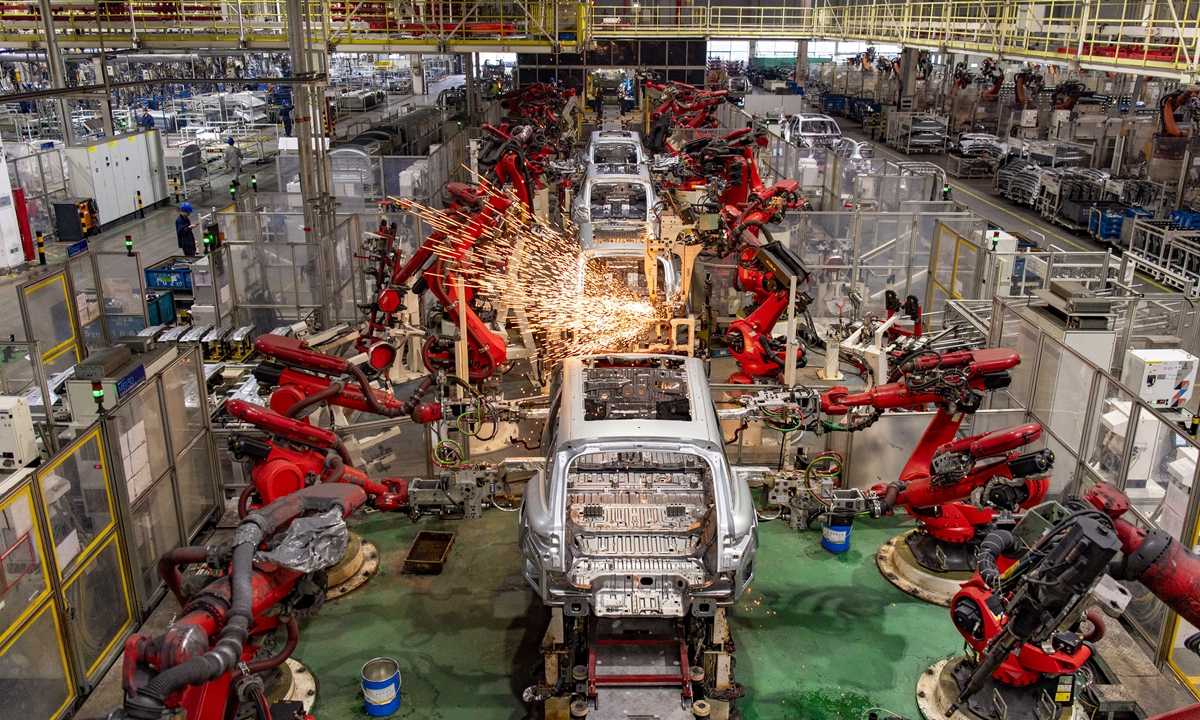
Industrial robots weld the frame of NEVs inside an automotive assembly in Jinhua, East China's Zhejiang Province on April 8, 2024. Photo: VCG
Governments of nearly 10 Chinese provinces and regions recently issued detailed plans for industrial equipment renewal based on local conditions, further supporting industrial enterprises' capacity upgrade amid increasing demand.
Northwest China's Ningxia Hui Autonomous Region on May 8 released an action plan to promote large-scale renewal of industrial equipment, covering eight sectors including metallurgy, nonferrous metals and chemical engineering.
The autonomous region's plan aims to gradually push forward equipment renewal, and lift industrial investment in 2027 by over 25 percent from the level in 2023.
North China's Tianjin Municipality also issued a similar plan clarifying multiple development goals and actions.
China's Ministry of Industry and Information Technology (MIIT) and six other government departments on April 9 jointly released a plan for promoting equipment renewal in the industrial sector.
Besides Ningxia and Tianjin, Central China's Anhui Province, East China's Zhejiang Province and Central China's Hunan Province have issued localized action plans, aiming to deploy advanced production capacity and boost efficiency.
Hunan's local government said on April 23 that it will emphasize green and intelligent transformation across local metal, food and textile sectors, and apply the latest artificial intelligence, 6G and big data technologies to industrial production.
The plan will promote equipment upgrades and technological transformation for more than 2,000 industrial enterprises each year, and encourage more than 10,000 industrial enterprises to expand capacity, improve production quality and efficiency within five years.
China's industrial system is addressing depreciation challenges after the nation's rapid economic development in the past several decades, as well as pushing for digitalized and informationized upgrading of old equipment, requiring concrete renewal plans, Cong Yi, a professor at the Tianjin University of Finance and Economics, told the Global Times on Monday.
There is still a lot of demand to be released, Cong said, adding that further policy support is needed to help industrial enterprises through this period.
China's value-added industrial output, an important economic indicator, went up 6.1 percent year-on-year in the first quarter of this year, data from the National Bureau of Statistics (NBS) showed.
The high-tech manufacturing sector registered growth of 7.5 percent, accelerating by 2.6 percentage points from the fourth quarter of 2023.
Chen Cailian, a distinguished professor whose major is the industrial Internet, told the Global Times in a recent interview that she has witnessed the fast growth of China's manufacturing industry, and she said a high level of self-reliance in science and technology is the basis for equal cooperation with other countries.
Her research has a sound connection with the smart manufacturing, such as electronic manufacturing and steel manufacturing.
"I have always said that we are just at the best time, no matter whether it is policy making or implementation, as well as the all-round support for scientific researchers, all displaying a very good trend of supporting tech innovation," she told the Global Times.




